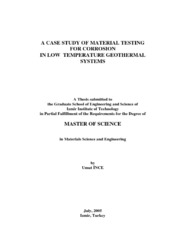Please use this identifier to cite or link to this item:
https://hdl.handle.net/11147/3293| Title: | A Case Study of Material Testing for Corrosion in Low Temperature Geothermal Systems | Authors: | İnce, Umut | Advisors: | Güden, Mustafa | Publisher: | Izmir Institute of Technology | Abstract: | The main goal of this study is to determine the corrosion rate and mechanisms of an St-37 steel material currently used as a pipeline material in Izmir.Balçova Geothermal District Heating System. Alternative steel piping materials, AISI 304, AISI 316, AISI 316L austenitic stainless steels, were also investigated for their corrosion behaviour in the same geothermal system. Two fluid velocities, 0.02 and 9.6 m/s, showing the low or stagnant and high velocity fluid flow respectively were selected for the corrosion experiments at the site. Intentionally prepared tensile St-37 test specimens were used to investigate the effect of corrosion (particularly pitting type of corrosion) on the ultimate tensile strength of the steel, while conventional test coupons were usedin the testing of stainless steels. These tests were further accompanied by the qualitative laboratory tests involving Ryznar stability index and electropotential measurements. It was found that laboratory measurements, Ryznar stability index, pitting resistance equivalent and electropotential measurements showed good agreement with the result of corrosion experiments conducted at the site. Although the uniform corrosion rates were relatively low in the tested steels, the pitting corrosion rate was greatly promoted in St-37 samples at the low fluid velocity, mainly driven by the SRB activity and tubercle formation. The tensile tests on the St-37 corroded samples have further shown that the UTS decreased as the exposure time increased. The decrease in the UTS of St-37 was more pronounced in the samples tested at the lower fluid velocity, which showed a good agreement with the measured maximum pitting depths found in these samples. The service life time of the St-37 was further predicted for two selected fluid velocities using the equations developed for the effect of defects on the bursting pressure of the pipelines. The predicted service life of St-37 was 57 and 95 months for low and high velocity fluid flow respectively. These service lives were also comparable with the reported service life of the pipelines used in the studied geothermal system. Finally, a solution were proposed to increase the service lifetime of St-37 pipes: addition of SRB activity reducing reagents to the fluid. | Description: | Thesis (Master)--Izmir Institute of Technology, Materials Science and Engineering, Izmir, 2005 Includes bibliographical references (leaves: 103-108) Text in English: Abstract: Turkish and English xiv, 120 leaves |
URI: | http://hdl.handle.net/11147/3293 |
| Appears in Collections: | Master Degree / Yüksek Lisans Tezleri |
Files in This Item:
| File | Description | Size | Format | |
|---|---|---|---|---|
| T000387.pdf | MasterThesis | 17.25 MB | Adobe PDF |  View/Open |
CORE Recommender
Page view(s)
416
checked on Apr 28, 2025
Download(s)
486
checked on Apr 28, 2025
Google ScholarTM
Check
Items in GCRIS Repository are protected by copyright, with all rights reserved, unless otherwise indicated.